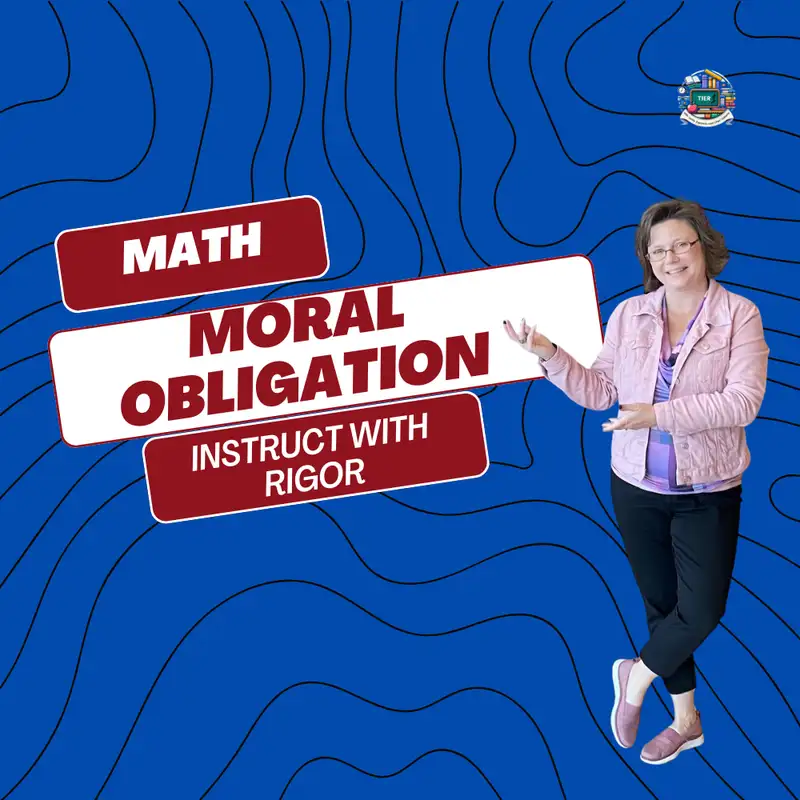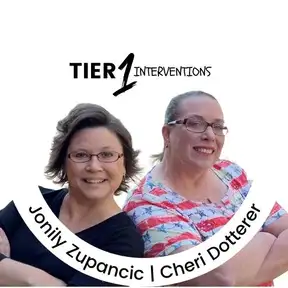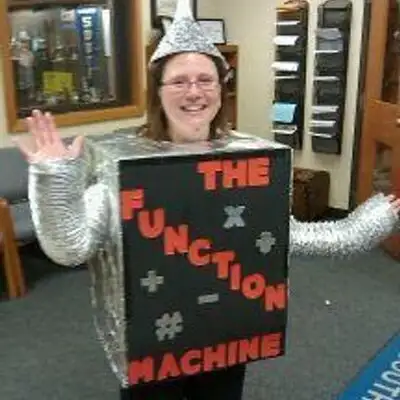
Moral Obligation in Math Education Why Good Teaching Isn’t Enough
Jonily: [00:00:00] Hey everybody, it's Cheri Dotterer here at Tier One Interventions podcast.
I'm here today with Jonily Zupancic and we are in class today with a live group of ladies and gentlemen who are learning about the Mastery Math method. So I'm gonna let Jonily talk and if there's any intervention that I wanna add to the puzzle, we will do but for now, I'm signing it all over to Jonily and let us learn a little bit about mathematics.
Girl. Y'all, this is Jay-Z. I'm Jonily Zupancic, I'm your math specialist, your main Mathineer. I if you are listening to this podcast or you're watching this podcast on YouTube I want to give a disclaimer and a warning. This is level two. You're listening in on a level two version of Mastery Math method.
Before I jump into the math, because we're gonna get, we're gonna get real spicy on the math today. Does anybody have anything to or share or comment [00:01:00] or whatever
the podcast is still on. I know there was a little pause, but I think it's important, even if you're listening to the podcast, one of the great instructional strategies is wait time. So I'm gonna ask again. I'm gonna wait again and I'm going to give double wait time. So anybody listening here live, do you have anything to add?
Any questions, any words of wisdom? Any thoughts? Go ahead. If you're missing, put in the comments. Got it. If you're on the podcast, put them in the comments. We will respond. It may take us a couple weeks. 'Cause I don't, we don't check the comments every day. Unfortunately. I don't, just don't have the time.
But put your information in the comments. We will get back to you. You know what, Cheri, I always forget about this. I always forget [00:02:00] about this. You are so good. I love you so much. And I'm gonna reiterate that if you're listening on a podcast or you're watching the podcast on YouTube, I've already said and subscribe.
But now it's even more important. To comment and start the conversation. Start the conversation and comment to each other. Even if Cheri and I don't get in there to respond, create your own community there. Get the comments going, say stuff. If you are tired of this too, then say it now. I do have to give another disclaimer.
Let's try to be as positive as we can. So I think that just, being a B and being negative and being that's, that hasn't changed anything. We see that all the time on socials and we continue to do that and it's not changing anything. It's like when students, they have bad behavior in schools and then we give a detention and we call home and we do [00:03:00] this and we do that.
We have to ask ourselves, did any of it change the behavior? Did any of it change the behavior? And if the answer is no, then we have to do something that's gonna change the behavior. So don't just get online and throw out your complaints about the school system. Okay. Nobody wants to hear that. Let's have good positive energy and real conversations about strategies and techniques that can actually make a difference and make changes.
Kirk, talk to us.
Kirk: I don't know if I can now, 'cause you told me not to be negative.
Jonily: Hey, you. Do you, Kirk, come on. Just, you do you go. My
Kirk: point is there is a lack of quality math teachers, and it's not a lack of quality teachers. It's a qual lack of teachers who have been trained to teach math well, okay.
So I'm not knocking teachers and no individual [00:04:00] districts. I think the public school system is not a good system. You got, I think, I'm a big supporter of homeschooling and I think we need to talk not just about teaching math differently, which is absolutely needed in step one. And I'm a huge supporter because that's my business.
I teach math differently than it's taught in public schools because not everybody learns the same way. It's not that they aren't good teachers, it's not that it's not a good curriculum, just not all students learn the same way. It's nobody's fault, neither good nor bad, but there needs to be an alternative way to teach math that those students do understand and do learn.
And that's my business. And that's, I think for anybody listening who wants to leave the public school and do their own thing, there is a huge market out there, a huge market. And just do things differently [00:05:00] than public schools and people will pay you. That's been my experience.
Jonily: And you know what Kirk, I have to say you follow me.
I follow you. But we are actually competitors in business because if everybody learns math,
Kirk: no, we can't be competitors. We're not competitive. We cannot be competitors.
Jonily: No, I, we're collaborators. But the point is, if everybody does the mastery math method in math classrooms everywhere Yeah. Then Kirk is be a, your tutoring part as far as your tutoring part.
Kids don't need it anymore.
Kirk: Exactly. And that's what we want. And that's the goal. Yes, absolutely. We're not competitors. We're working for the same thing.
Jonily: Yep. But in a business sense, if the classroom is strengthened, kids won't need tutoring.
Kirk: I don't care. I'll find something else to do.
Jonily: But that's my point, Theresa.
And then Kathy, I hear from you because you are teaching math methods courses, so you ahead, Theresa but
Teresa: maybe Kathy's the same way. [00:06:00] Isn't it all also the math, like we have math tutors in my system that go from building to building, helping the teachers with the math. So isn't it also the math tutors have to have.
Have to be up on the correct procedures and standards. So if they're not teaching the teachers how to do it correctly it's on their back. So they have to be the ones, presenting it and helping the teachers who don't have, the correct protocols and things that they're doing.
Absolutely. So we all, a lot of the teachers, they used to be more intense. Now they're less and less. So I think building wise, they need to have a lot more teachers in the building that do it. And look,
Hey everybody, it's Cheri again. If you're loving these strategies and you want to join our Mastery Math Method Masterclass, we hold this hour long event once a month and we'd love to have you join. [00:07:00] What we talk about there is how to improve your math skills in 10 days. Can you imagine 10 days, whether you are a math teacher or an occupational therapist, you can see exactly how to shift teaching so that every student, no matter their starting point, can master core math concepts and reserve.
So reserve your seat today and go over to disability labs.com/calendar to check out the next event.
Jonily: we're not, I, we're not bashing but we're not here to like, just like bash the whole system because let me tell you this, I was that teacher, I was that teacher that just didn't know what I didn't know.
I went through the K 12 system in the United States in mathematics. Now I succeeded from that system. So I thought everybody [00:08:00] did. But then in 1999, I started teaching eighth graders mathematics and I thought I was the most brilliant, best teacher. I was teaching great lessons and then I would assess the students.
And two weeks into my first year of teaching, I realized kids are not learning as a result of what I thought was my best instruction. Then I took it upon myself to start a journey of learning and growth and thinking counterintuitively about what these kids need. I was that teacher and it wasn't my fault.
I'm a product of my system. But that's what we're talking about here. We need to change the system. And Kathy, you are, would you like to speak? I don't wanna call you out. Okay, good. Kathy, you are, you have the system right in the palm of your hands.
Kathy: I teach undergrads how to teach math, so I teach math methods and for years it was just, [00:09:00] again, the definition of insanity.
You, we kept doing the same thing and expecting achievement to happen and all of that. And there's, you have to start there before they become teachers so that they understand there's a better way to do this because math teachers, more than any other type of teacher, tends to teach. We tend to teach math as we were taught because again, generally, as you said, if we're math teachers, we're mathy.
We get it. And we learned that way. So that must be the best way to learn. I was the exact same way and. You can't really understand why someone didn't. So you start looking for excuses and then the excuses build and the high school teachers blame it on the middle school teachers and the middle school teachers blame it on the elementary school teachers and then the pre-K teachers and it goes on and on, and the system doesn't get better.
So we have to start there and expose our teachers, let 'em know there is a better way and there [00:10:00] is hope for the future that way. And then tutors in the schools, I've been in the K 12 schools as well as tutoring on my own, but the tutors sometimes are, again, a victim of the system because maybe if kids aren't getting it in the regular classroom, they have an intervention period, or they have something else where that teacher instructs just like the classroom teacher.
And if they just say it a little louder or a little slower, but it's the same thing. And if the kids didn't get it, then now sometimes a second exposure is good because that will reiterate what they learned. But oftentimes it takes a lot more and that's where if we as teachers do not continue to improve and learn new methods and learn new strategies, it's never gonna change.
So we have to do that [00:11:00]
Natalie: spicy Natalie. I just wanna, let's go girl. I'm feeling very spicy, but more sp passionate. I'm feeling very passionate today. I was just thinking like the, being willing to learn and piggybacking what Kathy said, we gotta get these teachers early. I was, I've said it so many times, lucky enough to start in this method as a student teacher.
And even I'm still learning and growing and leveling up, and that's my big goal this year. But we have, I think eight brand new teacher, eight new teachers to our building, but I think it, six of them are fresh outta college and their energy is amazing. They're bright and shiny and I think just like we school it out of kids, it gets schooled out of us.
We become so jaded and. Cynical by like year two or three. It's oh, this, this. What's the new thing this year? Oh, that'll last a year. We school it out of ourselves. So I'm seeing these like bright, shiny new teachers and their [00:12:00] energy is everything and I'm riding that wave, but I'm feeling this like, how do we get them now?
How do we get them? And they're not all math teachers, but we happen to have one teacher that was a Feap student in my three years ago, and I'm just like bubbling over with energy and her enthusiasm and seeing where we can go. But I'm just feeling this passion. Like we gotta get them in Kathy's situation before they get out in their student teaching, before they get jaded.
We gotta bring 'em in.
Cedric: We’ve just seen how teaching is not only about content, but about the moral obligation we carry as educators to give students the very best.
What if we could take that same curiosity and weave it into stories students already love? That’s where we’re heading in the next episode how storytelling transforms abstract math into memorable, meaningful learning."
Until then, remember. every student deserves the [00:13:00] chance to see themselves as a mathematician. And as Cheri and Jonily say, Go Be Awesome! Go Be Brilliant! For you were put here for such a time as this.
Episode Video
Creators and Guests


